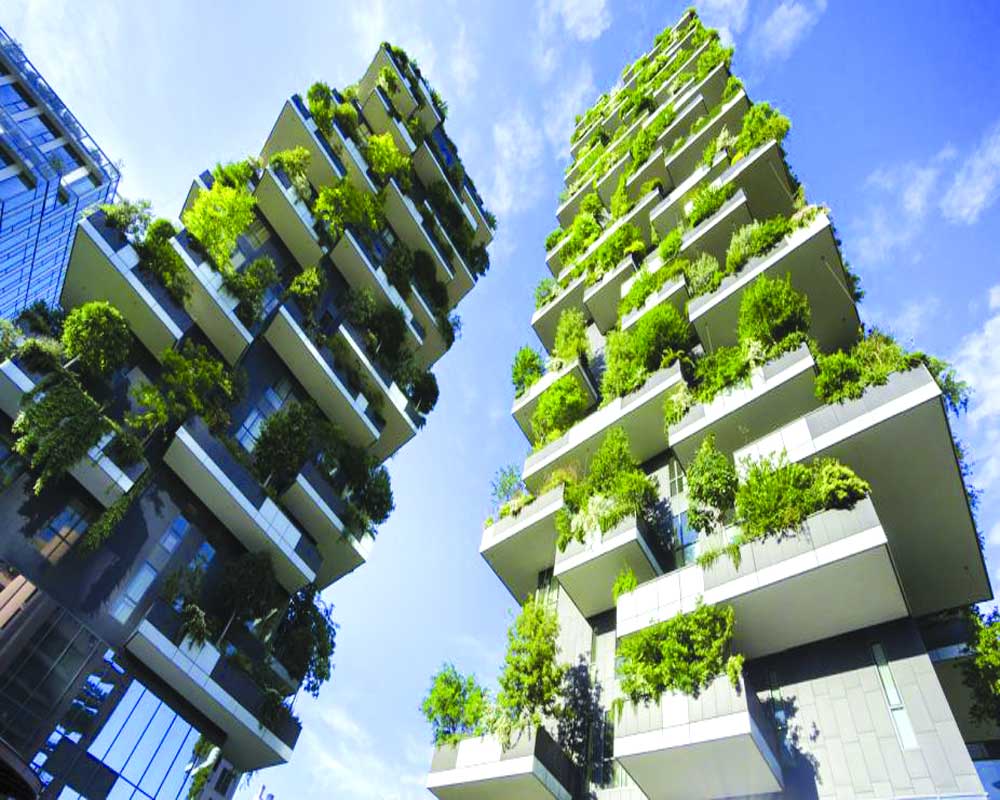Architects, real estate and the private sectors need to take the right steps and build climate-responsive, energy-efficient and spacious houses post COVID-19, says Archana Jyoti
The COVID-19 pandemic has brought and will continue to bring a number of changes in the setup we have been functioning in for decades. It is now all set to take residential housing to the next level. Future home-buyers are scouting for houses that have minimal footprints of the Coronavirus and fear of other infections apart from being affordable, especially in the backdrop of a faltering economy and job uncertainty.
The major requirements include good spaces to maintain the distancing norm. The need is to also work upon shelters that have climate-responsive design, efficient cooling systems, and solar energy integration to save the cost as well as ensure better health of the occupants.
Here is what some experts suggest about what is going to be the new normal for building homes.
Architect Ashok B Lal shares, “Especially, in a post-COVID world, the need for adequate shelter homes will become much more important than we ever thought simply because the need is to stay at home. Now, home will not just be confined to being a residential place but also be transformed into our partly-productive spaces. Therefore, comfort in these zones have become even more significant.â€
Providing a few must-follow plans for redesigning houses, he adds, “There are certain things which are extremely important. For example, having a thermal component, shading the windows, insulating the walls with simple material, completely insulating the roof so that the top floor is almost as good as the lower floor.â€
The work from home concept is becoming the next fulcrum for home-buying decisions, where the walk-to-work option has held the longest sway, says Anuj Puri, chairman, Anarock Property Consultants. He adds, “Millennials’ new-found preference for buying rather than renting homes are among the most prominent new residential real estate trends of the COVID-19 era.â€
Though the Eco-Niwas Samhita (ENS) entails adherence to the Energy Conservation Building Code for Residential Buildings in 2018 for the building and construction industry, aimed at taking care of much of the climate change threats, challenges thrown upon by such viruses and other infectious diseases looming large in the wake of uncertain weather conditions, these are not implemented.
Launched by the Union Ministry of Power and the Bureau of Energy Efficiency (BEE), the ENS sets standards for energy efficiency for residential buildings across the country. The code clearly documents the minimum building performance standards that need to be put into place to limit heat gains in climates where there is need for cooling and to limit heat loss in climates where there is a requirement to stay warm.
According to the research and advisory firm, Greentech Knowledge Solutions(GKS), the code also specifies standards for adequate natural ventilation and day-lighting potential.
Sameer Maithel, director of the GKS, suggests, “Over the past years, an increasing number of technical experts have agreed that there is a dire need for mainstream concepts of energy-efficient building design into the rapidly developing residential building sector in India and the ENS makes this possible. The Part I of the code, which was launched in 2018 on the National Energy Conservation Day, deals specifically with the building envelope.â€
However, not many who are planning and making buildings might be aware of how the building envelope can be designed to keep a home thermally comfortable. He adds, “Unfortunately, the trend over the past several years in India has been to use external energy sources, such as air conditioners and room heaters to keep houses thermally comfortable, instead of relying on the potential of the building design itself to achieve this.â€
So much so that in India, residential buildings contribute to 75 per cent of the overall energy consumption. “In fact, as household income increases, the use of external cooling and heating devices in homes is only rising. With these realities in mind, an energy conversation code for residential buildings becomes all the more imperative,†says Maithel.
Well, COVID-19 is going to expedite this urgency.
Currently, Andhra Pradesh, Gujarat and Rajasthan are already in collaboration with Indo-Swiss Building Energy Efficiency Project (BEEP) and BEE to provide technical support for the implementation of energy efficiency in buildings and specifically for the implementation of the ENS in their various housing projects for economically weaker sections.
Sameer points out that homeowners and those who live in these houses will greatly reap the benefits of the ENS. It is estimated that if the design of a residential building complies with the code, the inhabitants can save on their electricity bills by up to 20 per cent.
He explained that economically weaker groups, who are usually forced to living in houses that are unreasonably hot or cold, can live in a thermally comfortable house, by ensuring that the affordable and EWS housing schemes comply with this code, explains Maithel. Thankfully, the concept is now sinking among stakeholders too.
Furthermore, UNDP advisor Rakesh Kumar says that in the wake of COVID-19, the debates have been going on around how to ensure that the mega housing project proposed in Odisha is safe and healthy for the beneficiaries in the backdrop of health concerns arising out of the pandemic. This is just the beginning, private sector needs to be encouraged to take steps in the right direction.
(The writer is the Special Correspondent with The Pioneer. The article has been published as part of CMS-BEEP Media Fellowship Program.)


























